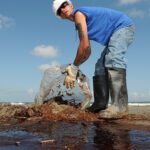The loop current likely to bring oil from the Gulf of Mexico spill to Florida Straits has shifted, according to news reports, although fears persist that oil could eventually hit the state. While there is no certainty that oil will reach Florida’s shores, the long distance and the shifting current have given emergency responders more time to prepare and implement a plan should this eventuate. Scientists believe too that, if oil does reach the Florida Keys, given distance and time frame, it would be less toxic owing to its biodegradability.

On Saturday, Governor Charlie Crist wrote Homeland Security Secretary Janet Napolitano asking for help in securing adequate amounts of containment boom and requesting that BP immediately opens claims offices in additional coastal counties.
Meanwhile, there is rising anger in Louisiana as oil hit the shore at Elmer’s Island and its marshes two days ago. NOAA said today in a statement, “oil was moving closer to the Chandeleur Islands and the threat of oil impacting the coastline remains high.”
As of May 22, according to NOAA, three oiled turtles were captured last week, while the total number of sea turtles stranded since April 30 within the “designated spill area”, is 204–193 dead and 11 alive. There have been 19 dead dolphins confirmed since April 30.
In related developments, President Obama announced the establishment of an independent National Commission on the BP Deepwater Horizon Oil Spill and Offshore Drilling, to be chaired by former Florida Governor and Senator, Bob Graham and former EPA administrator, Bill Reilly.
Among other duties, the Commission is tasked with examining the relevant facts and circumstances concerning the root causes of the Deepwater Horizon oil disaster; developing options for guarding against, and mitigating the impact of, oil spills associated with offshore drilling; and submitting a final public report to the president with findings and options within 6 months.


